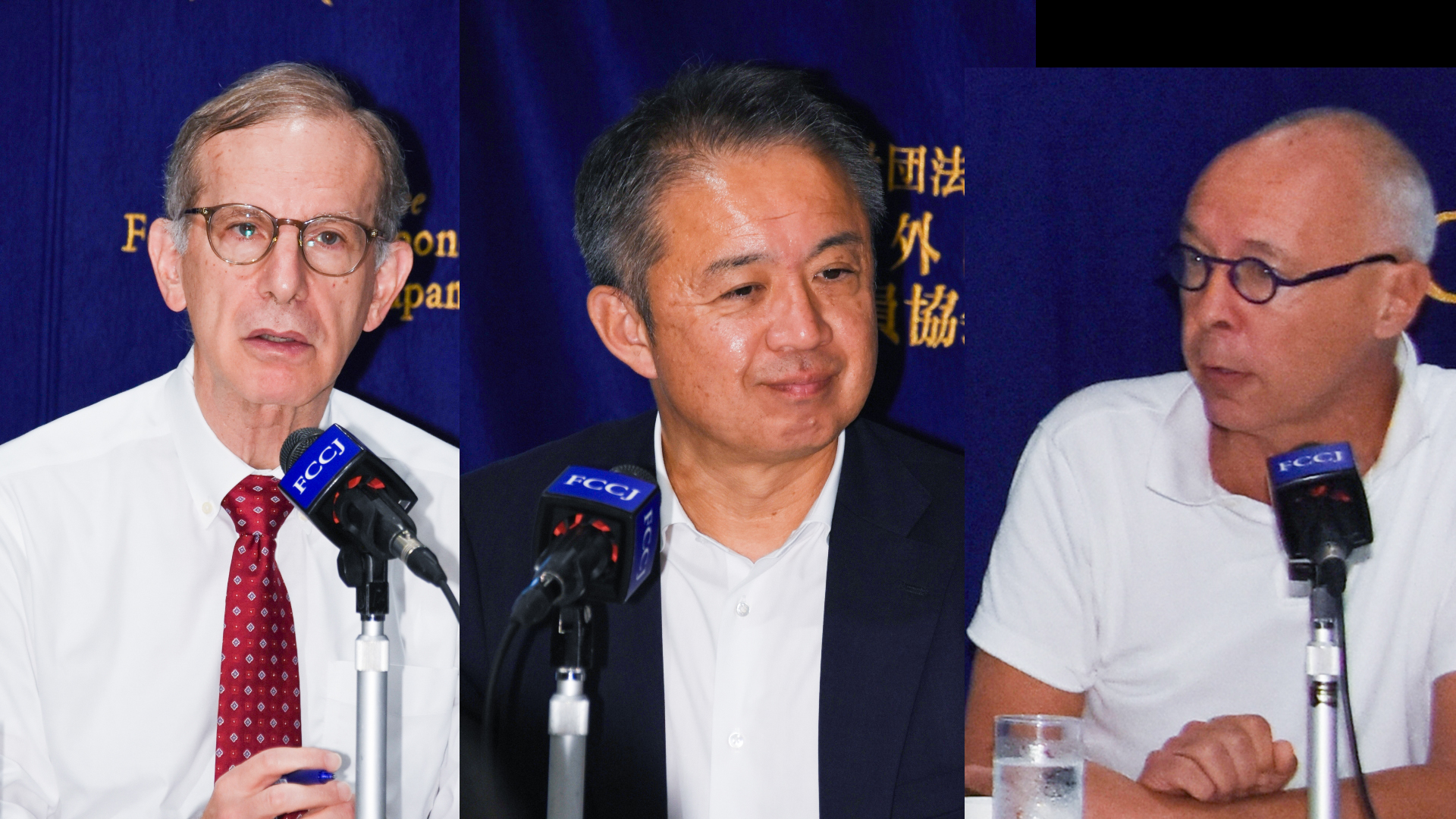Issue:
July 2023 | Deep Dive
Optimism over Japan's economy masks global risks that are hard to predict

Bulls are snorting and pawing the ground again around the Tokyo Stock Exchange (TSE), while bears that roamed the area for decades have gone back into hibernation. The Nikkei 225 stock index hit a 33-year high recently in closing above 32,000, and some say the market will go much higher.
"Over the next four to five years, the Nikkei could breach 40,000 or even 50,000," the veteran Japan analyst Jesper Koll told an FCCJ Deep Dive event in June.
It might go that high “sometime”, Tohru Sasaki, head of Japan Markets Research at JPMorgan Chase Bank, said at the event. “Just don't ask me when.”
A similarly cautious note was sounded by Robert Feldman, senior advisor at Morgan Stanley MUFG Securities. Japan's economy is doing well by world standards, he said, but added that “the world is not a good place for Japan to grow in” right now, with growth in the U.S., Europe and beyond looking sickly.
One thing the three experts were able to agree on during a lively and well-attended debate was that surging stock prices can mask underlying problems such as demographic issues and labour shortages that threaten to undermine Japan’s longer-term economic prospects.
This issue of impending labour shortages is more serious than is generally realised. Japanese firms are seeking to counter it by increasing capital investment in automation as well as in production overseas. But this can have its downside in balance of payments and other areas.
A frequent assumption is that Japan can compensate for a shrinking population and workforce by accepting more overseas workers, which is already happening to some extent. But as Sasaki noted, "Japanese wages are low by outside levels, so foreign workers may not wish to come to Japan."
The Deep Dive panelists agreed that Japan had entered a period of sustained higher inflation and higher interest rates, along with a weaker yen, as it emerges from decades of disinflation. And this says nothing of growing geopolitical tensions in and beyond Asia.
But stock market investors (especially foreigners, who nowadays account for some 70% of daily trading value on the TSE's First Section) have their eyes on other things, not least the weak yen, which, as Koll pointed out, helps to make Japanese stocks appear “cheap”.
Stocks aside, “real estate prices in Japan are attractive relative to the rest of the world" said Koll, adding that labor costs were also low by international standards. The cost of hiring an IT engineer in Japan, for example, is one third of that in Vietnam, he said.
All this appears to suggest that Japan could be set for another asset bubble, with capital pouring into the country to purchase stocks and property as well as to hire Japanese labour for staffing firms established or acquired in a potential new inward M&A boom.
If this were to happen, the yen could be expected to surge in value and not remain weak as the Deep Dive panelists predicted. But capital is in fact flowing out of Japan, as Sasaki, a former senior Bank of Japan official, noted, as it makes ever larger services payments to outside entities.
This is leading to a growing services deficit on the balance of payments, as Japanese step up overseas travel, invest more in easy-to-obtain foreign securities and stocks, and as payments rise for externally produced services such as Netflix and other forms of entertainment.
Even Koll, former chief economist for the U.S. investment banks JP Morgan Japan and Merrill Lynch Japan Securities, admitted that one thing that could shake his perennial optimism about Japan would be if its balance of payments were to fall into stuctural deficit – something that now seems possible.
Currently, strong inflows of foreign funds into the Japanese stock market ought to help drive up the yen – or at least to stem its continuing slide. But foreign investors in Japanese stocks mainly hedge their currency risk by means of forward sales of the currency.
That means the yen is likely to remain at or even below current levels for some time to come, the panelists said, especially as Kazuo Ueda, who recently replaced Haruhko Kuroda as governor of the Bank of Japan, is unlikely to to modify or abandon Kuroda's easy monetary policies anytime soon.
None of the panelists expected to see policy being tightened significantly, although Sasaki suggested that the band within which yields are allowed to fluctuate could be widened as early as June. Koll, meanwhile, suggested that although Ueda will be cautious in moving, when he does move it will likely be quickly.
How much benefit a weak yen will be to Japan's exports, its balance of payments and economic growth – as well as to corporate profits and stock prices – remains unclear.
Global demand for Japanese products – not least from China and much of Europe – is weakening, and as Feldman noted, while Japan's projected GDP growth for 2023 will likely be a modest 1%, growth in other advanced economies is expected to be only half that level.
Koll suggested that China could possibly devalue the yuan by 20% to 30% in 2023 as it battles slowing domestic growth and an increasingly hostile external environment. So, while it may appear to be all systems go for Japan, some lights are flashing amber rather than green.
Anthony Rowley is a columnist and contributor for the South China Morning Post.

